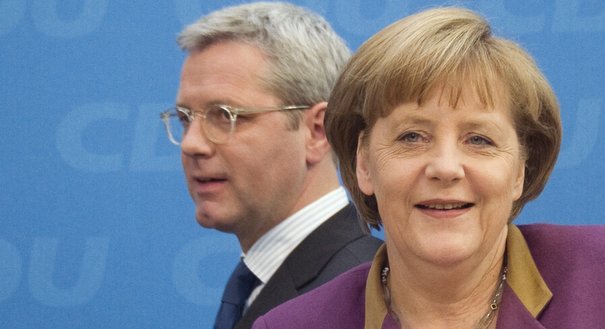German domestic politics, anyone? With Germany holding the key position in the pan-European struggle for survival in the financial crisis, and with populist movements on the rise in recent elections across Europe, a look at Berlin's political machinations might prove useful. Or, rather, a look at Düsseldorf, for that matter.
On Sunday, voters in Germany's largest and most important federal state, North-Rhine Westphalia (NRW), delivered a crushing blow to Chancellor Angela Merkel's center-right party, the CDU. Despite high hopes for victory just two months ago, the conservative's garnered a meager 26 percent of the vote and will not play a role in forming a government in Düsseldorf, NRW's capital. This defeat is only the latest in a series of weak showings by the CDU in state polls over the last two years.
Normally under such circumstances, Merkel, as the leader of the conservatives, would slowly but surely feel the heat coming from within her own party. Federal elections will be held in late 2013, and naturally the party must ask itself how it can remain in power when the trend looks so sobering. Well, the point is, the situation is not so sobering after all, not even after the NRW elections.
Merkel has three strong points that keep her relatively strong in face of all the bad news. The first one is that losses for the CDU at the state level have so far failed to translate into gains for the Social Democrats (SPD) at the national level. In nationwide polls, the SPD remains consistently below 30 percent, which is a result verging on the catastrophic for Germany's center-left mainstay.
The second strong point is that Merkel remains the most popular politician in Germany, a position she has occupied for some time now. Neither the eurocrisis, nor political turn-arounds, nor tactical gaffes have really damaged her so far.
The third point is that the German left is more fragmented than ever before in post-war history, with Social Democrats, Greens, and the emerging Pirates Party all wooing mostly center-left voters. Add to this the far-left "Die Linke", heir to the ideological leftovers from former Communist East Germany, and the fragmentation becomes very apparent. The chances of forming a stable coalition that could reliably run the country out of these four forces are very slim. Despite Merkel's gradual shift to the left, the German conservatives have so far managed to integrate their own right wing, thereby cementing the CDU's status as the strongest party in the German system.
As long as these three strong points remain intact, which I think they will for some time to come, she will not have to face a serious challenge from within her party.
What does this mean for foreign policy? Contrary to some voices from the German commentariat, the defeat of her party in North-Rhine Westphalia will not undermine her relatively strong position in Europe. Her coalition in Berlin stays as it is, for the time being, and with Wolfgang Schäuble earmarked to become the head of the eurozone, Merkel's position as the key player in Europe will be strengthened rather than weakened. The more assertive language coming from Francois Hollande after his election victory will not change that either, as Germany's economic and financial indicators make it untouchable as Europe's most important political force.
Merkel's difficulties lie elsewhere. They lie in the populist temptation the Social Democrats might succumb to. So far, the SPD in the Bundestag has supported her handling of the crisis. They have reliably voted in favor of bail-outs and stabilizing mechanisms. This has been in contradiction to the party's leftist instincts which would feel more comfortable with a more activist Keynesian policy of anti-cyclical spending. Even before the elections in NRW, the Social Democrats felt emboldened in their anti-austerity position by Francois Hollande's victory in the French presidential elections.
As a consequence, the party has now asked for a growth package to be attached to the European fiscal pact negotiated last year. Merkel has recently softened her crisis vocabulary, so such an amendment may or may not become a reality. But in the long run, Merkel must be concerned about the ideological leanings of the SPD, however weak that party may be. Why? As it looks now, her only viable option to stay in power after 2013 is to form a grand coalition with the SPD. Such an alliance would come at a price. Should an emboldened SPD ask for major concessions on the chancellor's crisis strategy, Merkel could be forced to make compromises on issues in which she has invested considerable political capital both at home and at the European level.
At the moment, such developments are mere speculations. Merkel has proven to be amazingly resilient and also flexible enough to react quickly to a changing domestic dynamic. NRW clearly hurts her, but it would be premature to write her off just yet.






